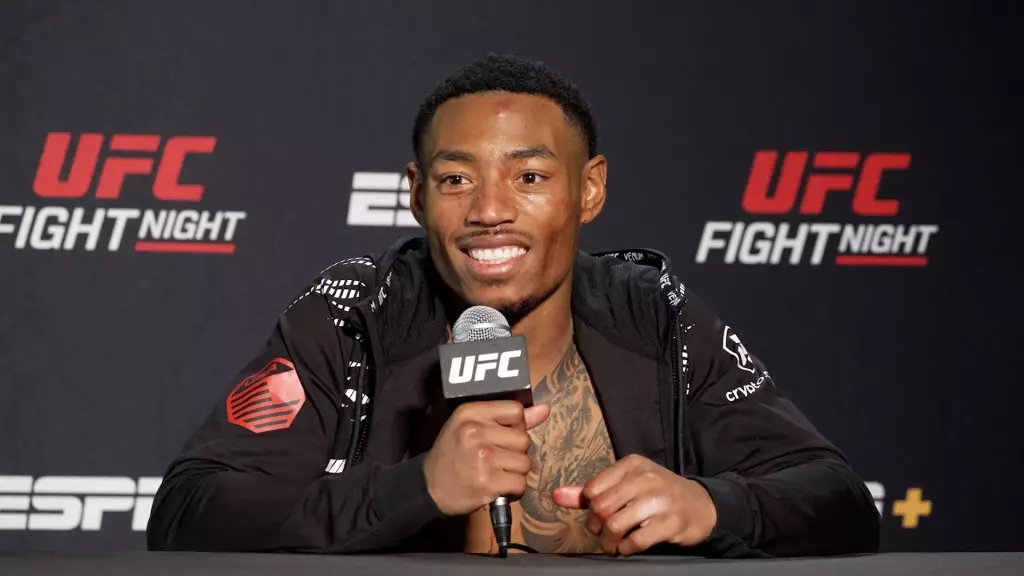In a thrilling bout at UFC Fight Night 251, Elijah Smith celebrated a major milestone in his career by defeating Vince Morales via unanimous decision. Clinching the victory with a score of 29-28 from all three judges, Smith demonstrated both his tenacity and skill in front of a lively crowd at the UFC Apex in Las Vegas. What made this fight particularly significant was not only Smith’s victory but his ability to evolve as a fighter, paving the way for what could be a lengthy career in the UFC.
Smith, like many athletes, has been shaped by his lineage—he is the son of former UFC fighter Gilbert Smith. This genetic predisposition may have contributed to his robust fighting spirit and adaptability in high-pressure situations. As Smith transitions into the UFC spotlight, he carries the weight of expectations, but he showcased a level of composure and strategic thinking that is critical for success in mixed martial arts.
Analyzing the contest, it was clear that Smith and Morales were evenly matched. Statistically, their striking, takedown attempts, and control time on the ground reflected a fight that could have gone either way. The evenly contested nature of the bout underscored the unpredictability inherent in the sport and highlighted the importance of not just physical prowess, but also mental acuity.
One of the most pivotal moments of the match came when Smith landed a perfectly timed uppercut that inadvertently cut Morales. The blood acted as a turning point for Smith; noticing the injury inspired a tactical shift. “Once I saw his face, I was like, ‘All right, let’s start targeting that,’” he reflected post-fight. This psychological aspect of the match—that adjustment upon recognizing a perceived weakness in an opponent—is a hallmark of experienced fighters.
While Smith’s striking was commendable, he also demonstrated resilience when facing Morales’ submission attempts, particularly an intimidating anaconda choke. His ability to remain calm, despite the tightness of the grip, speaks volumes about his mental fortitude. “I thought about tapping, but I just couldn’t,” Smith emphasized, illustrating his determination and thus setting a powerful precedent for his future encounters.
Post-match interviews revealed a significant aspect of Smith’s preparation: the emphasis on having a solid game plan. “On short notice, I think this time around we definitely game planned the perfect strategy,” he mentioned, pointing to the effectiveness of a well-thought-out strategy. This is an essential lesson for any aspiring fighter; technique and adaptability are pivotal in the octagon, but a clear, communicative plan can be the difference between victory and defeat.
Smith expressed a commitment to being coachable, a trait rooted in his sporting background. “The best athletes are the ones who can be coached,” he stated, reflecting a growth mindset that is likely to breed further success. It is refreshing to see a competitor acknowledge the influence of coaching and mentorship, illustrating the collaborative nature of combat sports.
Looking ahead, Elijah Smith has plans to make a significant impact in the UFC during 2025. “I want to at least get two more fights this year,” he asserted with determination. His eagerness to continue fighting and showcasing his talent indicates a hunger for growth and improvement. He also acknowledged a desire to elevate his fighting style to a point where he can secure quick finishes—a goal that speaks not only to his ambition but also to his understanding of the entertainment aspect of the sport.
Elijah Smith’s debut fight marks the beginning of an exciting journey in the UFC. He embodies a blend of skill, resilience, and strategic thinking that will serve him well as he climbs the ranks. As fans and analysts alike keep a close eye on his progress, it is clear that Smith is poised to make waves in the bantamweight division, eagerly embracing the challenges ahead.

